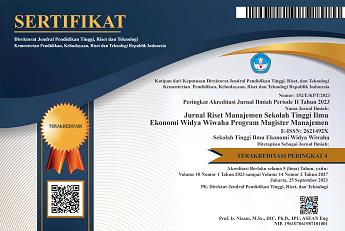MODEL PEMBERDAYAAN USAHA MIKRO DAN PENGARUHNYA TERHADAP KEMANDIRIAN USAHA
(Survey pada Usaha Jajanan di Kota Yogyakarta)
DOI:
https://doi.org/10.32477/jrm.v2i1.103Keywords:
micro entreprise, human resources, government roles, capital, partnership and autonomousAbstract
Yogyakarta is a city and the capital of Yogyakarta Special Region in Java, Indonesia. It is renowned as a center of tourism, education and culture. Yogyakarta is one of the foremost cultural centers of Java. This region is located at the foot of the active merapi vulcano. Yogyakarta is often called the main gateway to the Central Java as where it is geographically located. It stretches from Mount Merapi to the Indian Ocean. This province is one of the most densely populated areas of Indonesia. Yogyakarta is popular tourist destination in indonesia after Bali. These have attracted large number of visitors from across Indonesia and abroad to the city. This status makes Yogyakarta is one of the most heterogeneus cities in Indonesia. In edition, Yogyakarta has attracted large number of people to reside in this city for business. One of these comers is small entrepreneurs with their market munchies enterprise (specially a traditional snack trader). This business is one of famous business in Yogyakarta, we will find rows of pavement vendors selling market munchies. The students and tourists are their main target customers. Market munchies enterprise is part of small and medium enterprises SMEs as livelihood activities. SMEs has an important role in economic growth of Indonesia. Therefore, it is very important to develop and strengthen the micro enterprise empowerment. Micro enterprise empowerment is one of strategy to reduce the poverty rate in Indonesia. Major challenger in implement this program are that micro entrepreneurs are conventional and have satisfied with their revenue. It is very important to develop a comprehensive and sustainable micro enterprise empowerment which consist of strengthen the quality of human resources, maximize the government’s roles, empower the enterprise capital and strengthen the partnership and autonomous. Micro enterprise autonomy will contribute to the economic and investment climate. This will lead to establish an accountable enterprise both for the micro enterprise and customers which at the end will strengthen the development of the micro enterprise in Yogyakarta.
References
Berry, A.E. Rodriquez and H. Sandeem (2001), “Small and Medium Enterprises Dynamic in Indonesia”, Bulletin of Indonesian Economic Studies 37 (3) : 363-384
BPS (2013), Jumlah Penduduk dan Luas Wilayah Kota Yogyakarta
Bhargava, Ravi K. (1996), “Status of Rural Industrialisation and The Role of The Khadi and Village Industries Commission, India”, Makalah disampaikan dalam the Asia Pasifik Syomposium on Rural Industrialization, Juli 16-18, Colombo, Sri Lanka.
Chew, Rosal ind (1996), Safety nets for Entrepreneuship in Singapore, dalam Low Aik Meng dan Tan Wee Liang (ed) Entrepreneurs, Entrepreneurship and Enterprising Culture, Singapore: Addison-Wesley Publishing Co.,
D’Aveni, A. Rivhard (1998), Hypercompetition : Managing The Dynamics of Strategic Maneuvering, New York: The Pree Press
Gujarati, Damodar (1995), Basic econometrics, Mc Graw-Hill
Hafsah, M. Jafar (2000), Kemitraan Usaha : Konsepsi dan Strategi, Jakarta: Pustaka Sinar Harapan.
Hamid Edi Suandi dan Y.Sri Susilo (2011), “Strategi Pengembangan Usaha Mikro, Kecil dan Menengah di Provinsi Daerah Istimewa Yogyakarta”, Jurnal Ekonomi Pembangunan, Yogyakarta
Hammel, Garry and C.K. Prahalad (1998), Competing for The Future : Breakthrough Strategies for Seizing Control Your Industry and Creating The markets of Tomorrow, New York : Harvard Business school Press.
Harr, J. (1995), “The Internationalization Process and Marketing Activities : The Case of Brazilian Exports Firms”, Journal of Business research, 32 (2)
Hill, Hal (2000), Unity and Diversity: Regional Economic Development in Indonesiasine 1970, Singapore: Oxford University Press.
Hu, Ming Wen and Chi Schive (1996), “The Market Shares of Small and Medium Scale Enterprises in Taiwan manufacturing”, Asian Economic Journal, 10 (2)
Jellinek, Lea dan Bambang Rustanto (1999), “Survival Strategies of The Javanese during The Economic Crisis”, Laporan penelitian untuk bank dunia, tidak dipublikasikan.
Jhingan, M.I. (2004), Ekonomi Pembangunan dan Perencanaan, terjemahan D. Guritno, Jakarta: CV Rajawali.
Kompasiana (2013), Tingkat kemiskinan penduduk DIY tertinggi se-Jawa
Kusnadi (2000), Nelayan: Strategi Adaptasi Dan Jaringan Sosial, Bandung: Humaniora Utama Press.
Longenecker, Justin G., Carlos W. Moore and J. William Petty (1998), Small Business Management : An Enterpreneural Emphasis, Cincinati Ohio: International Thomson Publishing.
Martodireso Sudadi dan Widada (2002), Agribisnis Kemitraan Usaha Bersama: Upaya Peningkatan Kesejahteraan Petani, Yogyakarta: Kanisius.
Moini, A.H. (1995), “An Inquiry into Successful Exporting : An Emphirical Investigation using a Three Stage model”, Journal of Small Business Management, July, pp 9-25.
Nasir, M. (1999), Metode Penelitian, Jakarta: Ghalia Indonesia,
Porter, Michael E. (1997), Competitive Strategy, New York: The Pree Press.
Satrio, Awal Nugroho (2006), Kewirausahaan Berbasis Spiritual, Yogyakarta: Penerbit Kayon.
Sengenberger, W., G.W. Lovemen and Piore M.J. (2000), The Reemergence of Small Enterprises : Industrial Restructuring in Industrialises Countries, Geneva : International Institute for Labor Studies.
Simamora Henry (1987), Manajemen Sumber Daya Manusia, edisi kedua, Yogyakarta: Penerbit STIE YKPN.
Sugiyono (2001), Metode Penelitian Bisnis, Bandung: Alfabeta.
Sumardjo et al. (2004), Teori dan Praktek Kemitraan Agribisnis, Jakata: Penebar Swadaya.
Sumodiningrat, Gunawan (1999), Pemberdayaan Masyarakat dan Jaring pengaman social, Jakarta: PT Gramedia Pustaka Utama.
Undang-undang no 20 th 2008, tentang Usaha Mikro Kecil dan Menengah
Wiyono, Gendro (2011), Merancang Penelitian dengan Alat Analisis SPSS 17.0 dan SmartPLS 2.0, Yogyakarta, UPP STIM YKPN.
Yusi, Syahirman M. dan Rini Zakaria (2005), “Faktor-Faktor yang Mempengaruhi UpayaPemberdayaan Industri keci l Perkotaan di Kotamadia Palembang”, Laporan Penelitian atas biaya P5D Depdiknas, Politeknik Negeri Sriwijay
_____________, http//www.jogjakota.go.id









